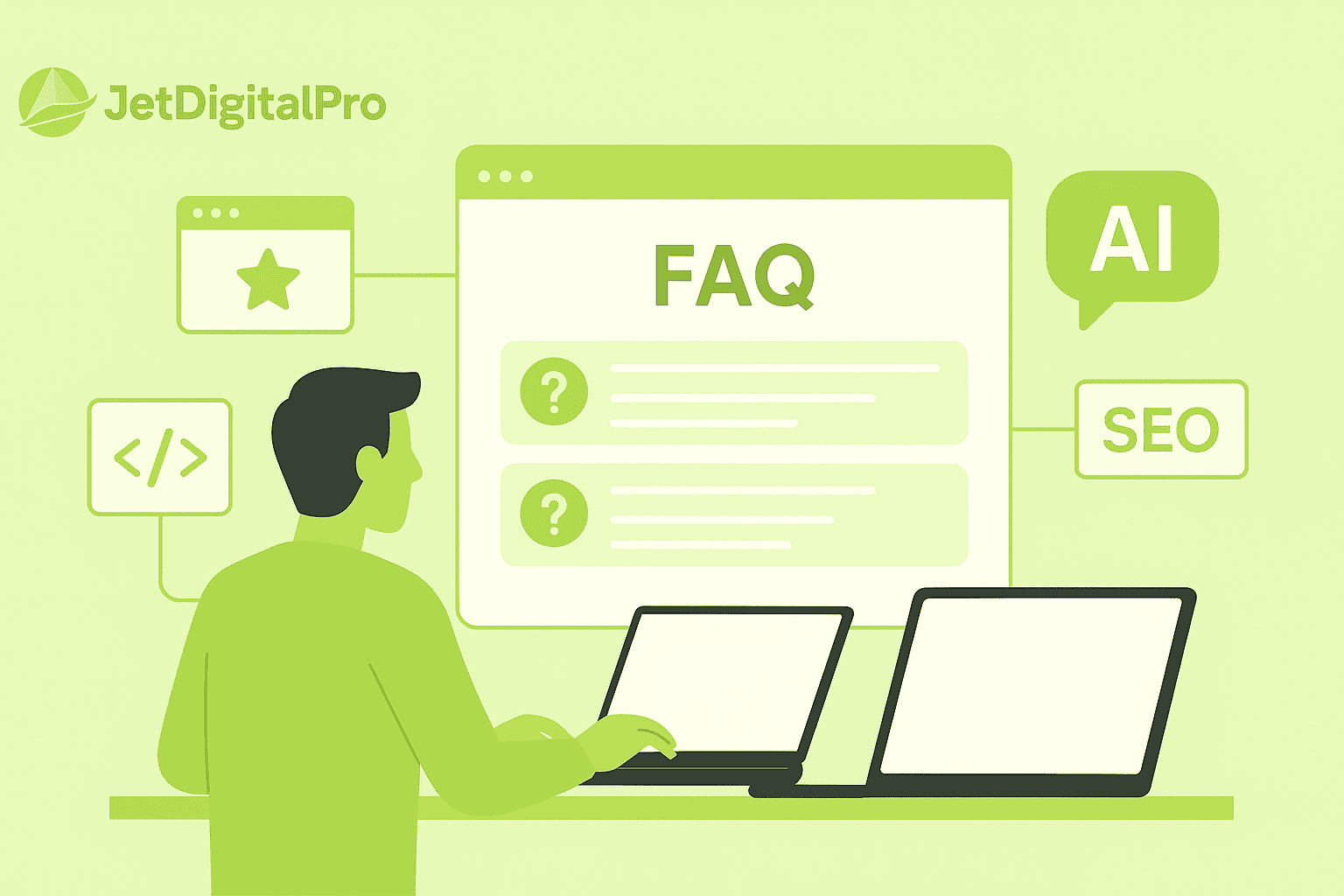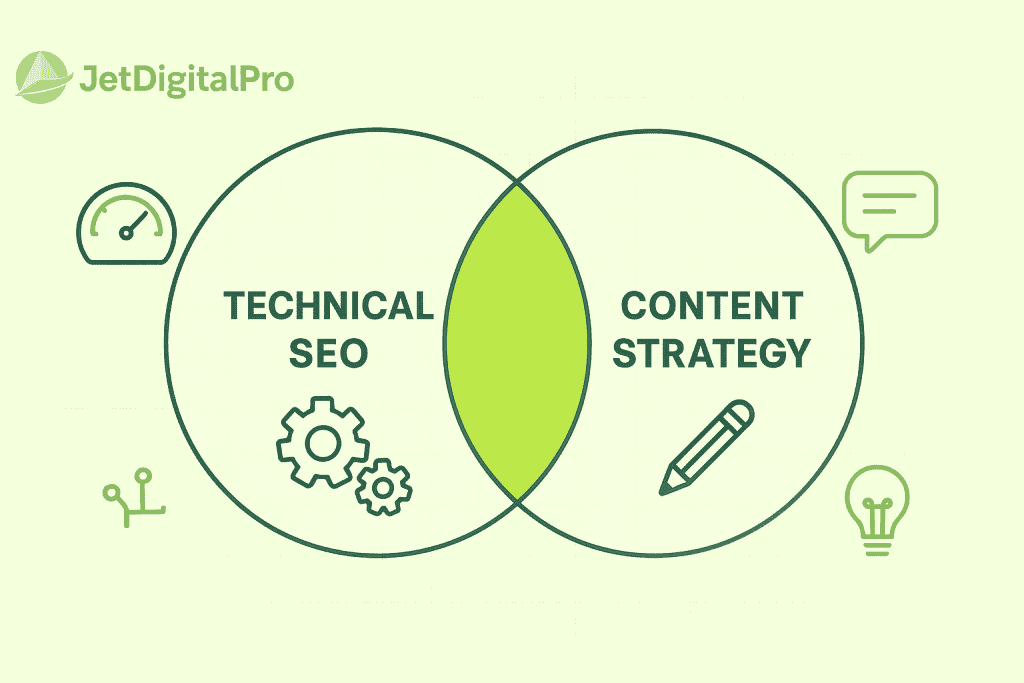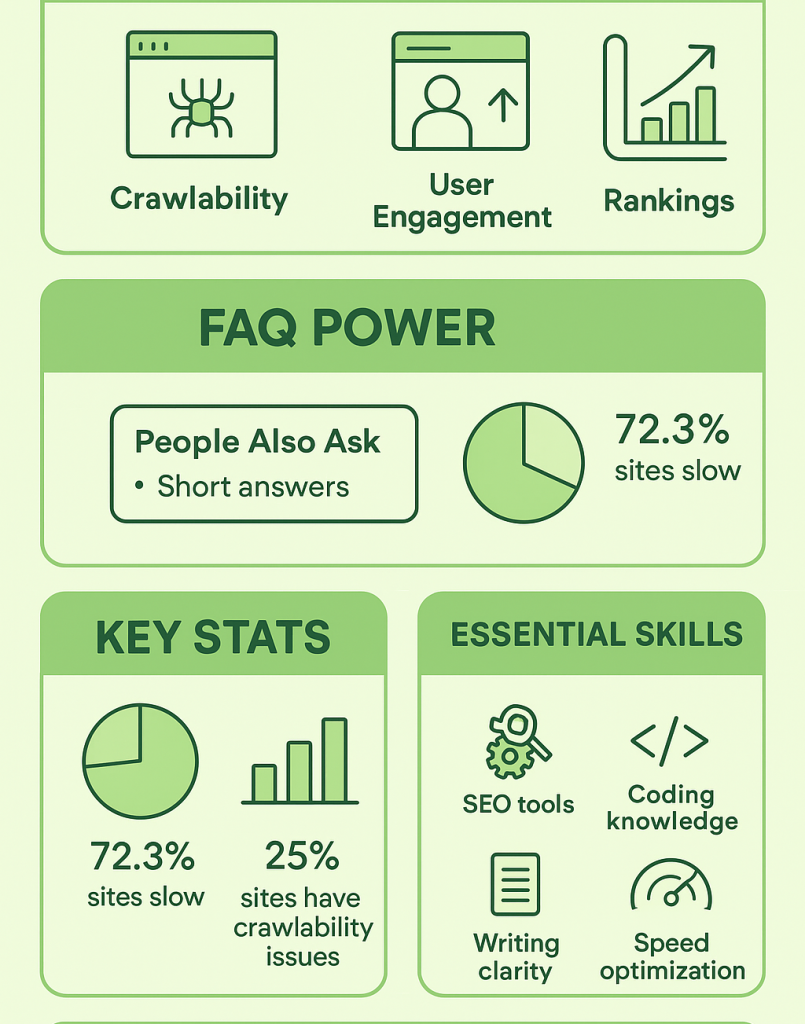
Technical SEO writing can feel overwhelming at first glance. Between meta descriptions and schema markup, there’s a lot to consider. But through our hands-on experience with dozens of sites, we’ve discovered it comes down to creating clear, organized content.
It’s similar to arranging books in a library, every piece needs a logical home where both visitors and search engines can find it. The right approach makes all the difference. Want to learn the essentials? Let’s explore.
Key Takeaways
- Technical SEO writing makes websites work better for readers and Google’s crawlers
- FAQ pages catch specific search terms people actually use
- Getting a tech-savvy writer helps your content keep up with Google’s changes
What Is Technical SEO Writing?
Picture a mechanic who’s also a storyteller, that’s basically what technical SEO writing is about. It’s not just throwing words on a page. You need to know how search engines read your site, from the code snippets to loading times. Someone’s got to connect what the tech team builds with what readers see.
Here at Jet Digital Pro, we make sure Google can easily read every page. That means clean headings, natural keywords, and content that flows well. No fluff allowed, it just slows things down, and speed matters for rankings now. Our SEO article content writing service applies these same principles, ensuring every piece is structured for both readability and technical SEO precision.
Technical SEO writing covers:
- Creating titles and descriptions that catch eyes but still use key terms
- Adding special code (like FAQ markup) so Google shows extra info in search results
- Setting up clear content structure with proper headers
- Working with developers to keep pages loading fast
- Optimizing site speed is crucial; 72.3% of sites have slow pages, which can hinder SEO performance. [1]
You need three things to do this right: SEO smarts, tech knowledge, and writing skills that don’t put people to sleep. The trick is keeping both Google and real readers happy without shortchanging either one.
Creating SEO-Optimized FAQ Pages

Most sites toss FAQ pages in as an afterthought, but they’re actually SEO powerhouses. Through countless client projects, we’ve seen these pages grab those sweet spots in Google’s “People Also Ask” boxes, the ones everyone wants. And let’s be real, who doesn’t click on those featured snippets?
Keep your FAQ answers short and sweet. Nobody’s got time for a novel when they just need quick info. Bullet points are your friend here.
Here’s the deal with FAQ pages:
- They catch those specific questions people type into Google
- Keep folks on your site longer (because they actually find what they need)
- Help Google understand what you’re about with special FAQ code
Making FAQs work takes some effort:
- Dig through your support tickets and social comments for real questions
- Bundle similar stuff together with clear headers
- Weave in related keywords (but don’t force it)
- Make sections expandable so it’s not overwhelming
- Link to your other pages where it makes sense
Pro tip: Don’t let your FAQs gather dust. Questions change, businesses grow, and Google loves fresh content.
Hire a Technical SEO Content Writer
Finding someone who gets both the tech side and writing isn’t easy. You need more than just someone who knows grammar or can throw around SEO terms. Look for someone who understands the nitty-gritty of SEO but won’t put readers to sleep.
When we’re adding writers to our team, here’s what catches our eye:
- SEO chops: knows their way around keyword research and tools like SEMrush
- Tech savvy: understands site maps, coding basics, and data structure
- Writing skills: keeps things clear without dumbing it down
- Numbers person: gets why page speed and bounce rates matter
Give potential writers a test project, portfolios are nice, but seeing their actual work for you tells the real story.
Check out places like Genius or Truelancer for writers who know their stuff. Just remember, even the best writer needs clear deadlines and good communication to deliver their best work.
The Intersection of Technical SEO and Content Strategy

Let’s get real about technical SEO writing, it’s more than ticking boxes on a checklist. Think of it as building a house that both looks good and stays standing. From our experience working with dozens of sites, here’s what really matters:
Finding the right mix of keywords (including those long, specific phrases people actually type)
- Linking pages together in a way that makes sense
- Writing titles and descriptions people want to click
- Making sure everything works on phones (because who uses desktop anymore?)
- Keeping pages loading fast (nobody waits more than 3 seconds these days)
At Jet Digital Pro, we mix smart tools with old-school editing. Sometimes the robots help, but humans still know best when it comes to making content that doesn’t sound like it was written by a toaster.
Technical SEO Writing Challenges and How to Solve Them
Nobody said this would be easy. Here’s what tends to trip people up:
- Copy-paste content showing up everywhere (Google hates that)
- Websites that look like mazes to search engines
- Stuffing keywords in like there’s no tomorrow
- Trying to keep content fresh when you’re running dry on ideas
First step? Get under the hood with an SEO checkup. Find those broken links, figure out where Google’s getting confused, and see how bots crawl your site. Tools like Search Console show you the raw data, what’s working, what’s broken, where people click.
Addressing crawlability issues is vital; 25% of websites face crawlability problems due to poor internal linking and robots.txt errors. [2]
Bottom line: make it easy for Google to read your site and even easier for real people to use it. No rocket science required.
How Jet Digital Pro Approaches Technical SEO Content Writing

We take a different path here. No cookie-cutter content, just solid SEO work that fits what you’re already doing. Every piece goes through 11 rounds of human eyes (yeah, we’re kind of obsessive about quality). Sure, we use some smart tools for finding keywords and grouping topics, but robots don’t get the final say.
Got an agency? We’ve got your back. Our white-label setup means you can scale up without hiring more people. We handle the heavy lifting, from picking keywords to planning when stuff goes live. You just watch the SEO results roll in.
This isn’t a one-and-done deal. Google changes its mind more often than most people change their socks, so we keep tweaking and testing to see what clicks with your readers.
Practical Advice for Getting Started
Are You a Digital Agency?
White Label SEO Content Services for Agencies
Scalable, customizable, and results-driven content solutions for your clients.
New to this whole technical SEO thing? Here’s what actually works:
- Look at your current content, what’s broken? What needs fixing?
- Talk to your customers. What questions keep coming up? That’s your FAQ gold mine
- Find writers who know their way around SEO tools (and won’t bore readers to tears)
- Add those fancy FAQ tags Google loves so much
- Keep an eye on your numbers, how long do people stick around? How fast do pages load?
- Write like you’re talking to a friend, not a search engine
FAQ
How can technical SEO improve crawlability and indexability for content-heavy websites?
Technical SEO helps search engines crawl and index pages efficiently, which is crucial for content-heavy sites. Implementing proper XML sitemaps, robots.txt files, canonical tags, and structured data ensures search engines understand site architecture and content hierarchy.
Optimizing site speed, mobile responsiveness, and internal linking also impacts crawl budget management, indexability, and overall SEO content optimization for better search engine rankings.
What role does schema markup and FAQ schema play in enhancing structured content visibility?
Schema markup, including FAQ schema and JSON-LD, makes content more understandable to search engines and improves chances for rich results. Structured data signals topical authority, supports featured snippets, and enhances People Also Ask visibility.
Proper implementation alongside meta tags, heading tags, alt text optimization, and canonical tags can boost SEO content optimization, CTR, and overall user experience SEO on both desktop and mobile-first indexing setups.
How does content siloing and internal linking influence technical SEO and topical authority?
Content siloing and strategic internal linking organize pages by topic clusters, helping search engines identify related content and understand site architecture. Using semantic keywords, long-tail keywords, and anchor text thoughtfully improves SEO content optimization while reducing duplicate content issues.
Combined with page titles, meta descriptions, and heading tags, siloing strengthens topical authority, lowers bounce rate, and improves user experience SEO across the site.
Why are site speed optimization and core web vitals critical in technical writing for SEO?
Fast load times, server response optimization, and lazy loading affect page rendering and user experience SEO. Core web vitals, including LCP, CLS, and FID, directly impact search engine rankings. Integrating mobile optimization, responsive design, SSL certificates, and HTTPS ensures better crawlability and indexability.
Need a Strategic SEO Content Partner?
Let’s craft SEO content that ranks, converts, and grows your brand.
Talk to UsOptimizing technical SEO elements alongside content freshness, thin content removal, and structured content helps reduce bounce rate and improve overall SEO content optimization.
How do redirects, canonical issues, and sitemap submissions affect long-term SEO content performance?
Handling 301 and 302 redirects, addressing canonical issues, and submitting updated XML sitemaps are essential for maintaining crawl budget and search engine rankings. Technical SEO practices like content pruning, noindex tags, broken link fixes, and pagination SEO support sitewide SEO maintenance.
Proper URL structure, HTTPS implementation, and log file analysis ensure that SEO content optimization remains effective while enhancing web accessibility, rendering optimization, and overall user experience SEO.
Wrapping Up Technical SEO Content Writing
Technical SEO content writing is more than just inserting keywords. It’s a careful balance of technical know-how and clear communication that helps your site perform better in search results and keeps users engaged. Jet Digital Pro’s approach is built around this balance, providing scalable, high-quality content solutions that digital agencies can trust.
By focusing on SEO-optimized FAQ pages, hiring the right technical writers, and understanding the technical aspects of SEO writing, you’ll put your website in a strong position to rank higher and serve your audience better.
If you want content that’s crafted with this thoughtful, hybrid approach, contact Jet Digital Pro today to discuss how we can support your agency with white-label SEO content solutions.
References
- https://ahrefs.com/blog/seo-statistics/
- https://www.pageoptimizer.pro/blog/technical-seo-statistics-that-you-must-know-in-2025
P.S – Whenever you’re ready,
we’re here to help elevate your SEO content.
Partner with us for strategic, scalable content that drives real organic growth.
Contact Us Now
